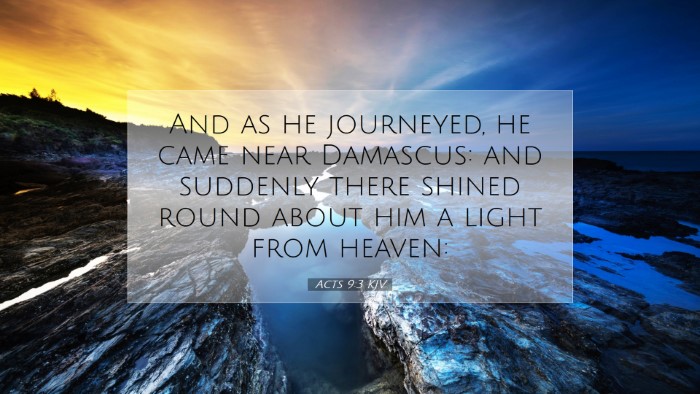Commentary on Acts 9:3
Verse: "As he journeyed, he came near Damascus: and suddenly there shined round about him a light from heaven."
Introduction
Acts 9:3 marks a pivotal moment in the early Church, capturing the divine intervention that transformed Saul of Tarsus into the Apostle Paul. This significant event not only illustrates God’s sovereignty but also highlights the profound theme of redemption present throughout Scripture. In this commentary, insights from renowned public domain scholars such as Matthew Henry, Albert Barnes, and Adam Clarke will be woven together to provide a comprehensive examination of this verse.
The Context of the Passage
The journey to Damascus is crucial for understanding the background of Saul’s character and mission. Saul was fervently persecuting the early Christians, believing he was serving God by eradicating what he perceived to be heresy. This act of zealousness eventually sets the stage for his dramatic conversion.
- Matthew Henry: He emphasized Saul's mission to arrest Christians, indicating his deep-seated conviction of righteousness, which was misguided.
- Albert Barnes: Barnes notes that the act of traveling to Damascus highlights Saul’s commitment and the intensity of his anti-Christian fervor.
- Adam Clarke: Clarke discusses the socio-political context, noting that Damascus was a prominent city, and Saul’s actions would have had considerable implications for the nascent Church.
The Divine Encounter
The suddenness of the light signifies an interruption of Saul's earthly journey with a celestial revelation that changes the trajectory of his life. The divine light symbolically represents the truth and justice of God breaking into human history.
- Matthew Henry: He remarks on the suddenness of the divine light as representative of God's ability to transform lives instantaneously.
- Albert Barnes: Barnes interprets the light as a manifestation of God's glory and power, underscoring the unearthly nature of this encounter.
- Adam Clarke: Clarke elaborates on the physical and spiritual ramifications of the light, suggesting it was more than a mere phenomenon but a divine intervention aimed at Saul's heart.
Symbolism of Light
The light from heaven not only serves as a physical manifestation but also carries deep theological implications.
- Matthew Henry: Asserts that light often symbolizes knowledge, purity, and the presence of God, which stands in stark contrast to the darkness of sin.
- Albert Barnes: He draws parallels to other biblical instances of divine light revealing truth, thus inviting discussions on similar encounters among biblical figures like Moses and Isaiah.
- Adam Clarke: Clarke argues that this light calls into question the moral blindness of Saul, emphasizing that true enlightenment comes from Christ alone.
Theological Reflections
This verse compels the reader to reflect on key theological themes that arise from Saul’s encounter with the heavenly light.
- Grace and Sovereignty: The transformation of Saul illustrates the powerful truth that God can reach even the most hardened hearts. As Henry notes, the grace of God does not depend on human merit.
- The Nature of True Conversion: This event symbolizes the divine initiative in salvation. It emphasizes that genuine conversion often happens in unexpected ways, a theme reiterated by both Clarke and Barnes.
- Witness to the World: Saul's transformation sets the stage for his future ministry. His experience exemplifies God’s plan to use the least likely instruments for His glory, paralleling Matthew Henry’s idea that God delights in using the unworthy.
Practical Applications
For pastors, theologians, and students, Acts 9:3 presents multiple avenues for practical application in their ministry and studies.
- Embracing Transformation: This verse challenges believers to consider their own journeys and the transformative power of Christ in their lives.
- Understanding Divine Timing: The sudden nature of Saul’s encounter reminds us of the unpredictability of God’s workings, urging believers to remain open to divine guidance.
- Encouragement in Ministry: For those who minister, the passage serves as a powerful reminder that no one is beyond the reach of God’s grace, encouraging perseverance in outreach efforts.
Conclusion
Acts 9:3 is not merely a historical account but a profound testimony of God’s redemptive work in humanity. Through the insights of Henry, Barnes, and Clarke, the verse is illuminated with theological depth and practical significance, encouraging believers to recognize God’s sovereign hand in their lives and the lives of others. The transformative light that enveloped Saul not only changed him but also reshaped the Christian Church, reminding all believers of the power of grace and the calls to action that accompany such divine encounters.


